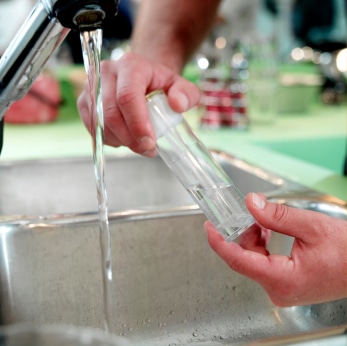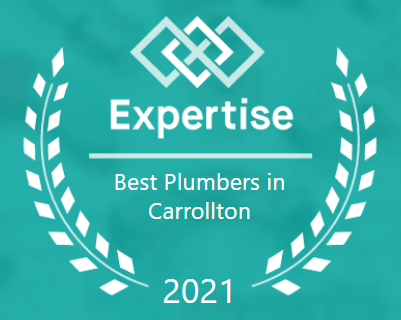
If your home has a hard water supply, you’ll eventually need to use a descaler to deal with limescale and other mineral deposits. But what is a descaler? We delve into all the details, including how and why mineral deposits form, what is a descaler, and how to use a descaler on scale buildup. If you’re dealing with hard water mineral deposits and need to know what to do, CW Service Pros has your back!
What Are Hard Water and Soft Water?
All the tap water that’s obtained directly from natural water contains dissolved minerals in varying amounts. Some contains only trace amounts of minerals, while some contains larger amounts of dissolved minerals, primarily calcium and magnesium.
House water that has a high mineral content is “hard” water. Water that has low mineral content is “soft” water.
Water becomes hard when it passes through natural deposits that contain chemical compounds of calcium and magnesium. These include chalk, gypsum, and limestone. As the water percolates through these deposits, some of the minerals dissolve into the water. The more dissolved minerals the water contains, the harder it becomes.
The Effects of Hard Water in the Home
Hard water isn’t toxic or dangerous to human health. In fact, if you’re deficient in either calcium or magnesium, drinking hard water can be good for you because it supplies the minerals you’re lacking.
But there are some negative effects of hard water that you’ll notice around your home. The three main issues caused by hard water are:
1. Soaps and Detergents Don’t Lather
Hard water doesn’t lather easily. If your home’s water is hard, you may notice that:
- Soaps and shampoos don’t lather. It may be harder to get your hair clean and harder to fully rinse off shampoo.
- Laundry and kitchen detergents don’t lather easily. Clothes may not get rinsed properly in the rinse cycle.
2. Soap Scum Residue
You may notice soap scum deposits on bathroom surfaces. It can sometimes be found on kitchen and laundry surfaces too. Soap scum is a chalky residue that contains minerals, dirt, and soap. It forms because fatty residues in soaps and dirt react with dissolved minerals in hard water.
Soap scum looks like a dirty off-white or gray film on surfaces such as shower doors, sinks, and the bathtub. It can be difficult to remove, especially if surfaces aren’t cleaned regularly.
3. Scale and Sediment Buildup
Another consequence of hard house water is that over time, those dissolved minerals accumulate as calcium carbonate and magnesium carbonate on the surfaces and within fixtures and appliances that use water, as well as in the water pipes running throughout your home. This is called scale, or scaling. The buildup of calcium scale, in particular, is often referred to as limescale.
Scale can build up on any fixture or appliance that uses water. This includes:
- Pipes, faucets, showerheads, and on sinks, bathtubs, and toilets
- Hot water tanks and tankless water heaters
- Dishwashers, coffee makers, and laundry machines
Any fixtures and appliances with scale buildup are harder to clean. If sediment buildup is heavy enough it can affect how fixtures and appliances function and how efficient they are. For instance, with hot water tanks and tankless water heaters, heavy sediment buildup reduces energy-efficiency, meaning the appliance uses more energy to keep water hot.
What Is a Descaler?
A descaler is a method of dealing with mineral deposits. That includes mineral buildup of both limescale calcium and magnesium. Some descalers also remove oxidized metal deposits, rust, and other debris.

Water Softeners vs Water Descalers
There’s more than one way to deal with the effects of hard water. The two main categories of hard water treatment systems are water softeners and descalers. Do you need a water softener or descaler? Learn more.
Water softeners are used to treat water as it enters the home. This option removes dissolved calcium and magnesium from the water and replaces them with sodium ions. It prevents hard water problems like soap scum and scaling from affecting the plumbing system but does add sodium to the drinking water.
Water descalers are different because they don’t remove minerals from water. Instead, they use a low frequency electromagnetic signal to reverse the charge of the molecules and cause them to attract. This allows them to pass through the plumbing system without sticking and depositing on surfaces.
There are also liquid descalers, which are chemical descaler solutions that remove scale deposits from fixtures and appliances. These should never be used without first ridding the system of the chemical. They are meant to clean scale from items but not to be consumed in drinking water.
How Do Water Descaler Systems Work?
All water descaler systems work by treating water to prevent dissolved minerals from being deposited on surfaces. But different types of descaler achieve this in different ways:
Electric descalers work by applying a low-voltage electrical current. This gives the water an electric charge that keeps mineral particles from being able to deposit on surfaces. They often use a process called template-assisted crystallization, which forces dissolved minerals to form into crystals. The crystals are chemically stable, so they stay suspended in the water, where they are unable to affect your plumbing system.
How Does Liquid Descaler Work to Remove Scale Deposits?

Liquid descalers, or descaling agents, are acidic liquids that react with the calcium and magnesium ions in scale deposits. They work via a chemical reaction that turns calcium and magnesium carbonate deposits into soluble salts that easily wash away.
Even weaker acids, such as vinegar and lemon juice, can be used to remove scale deposits. But because these are weak acids, they’re not suitable for very heavy scale deposits.
Commercial brands use stronger acids, so they’re more effective and work more quickly. However, this also means they’re more hazardous to use and require more caution. In addition, stronger acids can damage fixtures and pipes if used too often.
The best solution is to treat scale deposits promptly with weaker acids such as diluted lemon juice and vinegar, as this minimizes the damage.
Do You Need a Descaler in Your Home?
Whether or not you need a descaler in your home depends on your home’s specific hardness level. It also depends on what kind of water treatment solution you prefer. Since you have multiple options for dealing with hard water, it’s important to consider which is best for your situation.
Both water softeners and water descalers reduce scale or prevent scale deposits from forming, but since descalers don’t remove minerals from water, they don’t solve all of the problems associated with having large concentrations of multiple minerals in your water. In contrast, because water softeners do remove dissolved mineral particles, water problems such as lathering and soap scum are also solved.
In general, water descalers are best if:
- Your home’s water hardness is mild to moderate.
- You prefer to have less system maintenance.
- You prefer to have less cost both on the purchase and installation, as well as the ongoing maintenance.
If your water is extremely hard, then a water softener may be a better solution.
In most parts of the Dallas-Fort Worth area, water is moderately hard. This means a water descaler is a great solution to your hard water problems. But if you want a complete solution that solves all the issues associated with hard water, consider a softener.
Solve Your Hard Water Problems: Talk to CW Service Pros Today!
Hard water can cause a wide range of problems in the home, but you don’t have to deal with them at all because we can help you solve them! Get rid of your hard water problems by calling CW Service Pros today. We offer solutions that work for your home and family, and we’ll perform any required installation quickly and cleanly. And talk to us about a home water filtration system!
















